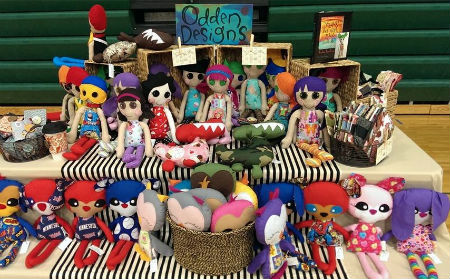
Recently my sister in-law, Melanie, shared with me the success of her initial ventures into a new business selling a collection of handmade dolls, stuffed animals and blankets. A successful medical career working at a hospital keeps her more than busy, but the side venture is enabling her to make her creative hobby into something more.
Our recent discussion about turning this venture into a business surfaced many questions that a lot of new business owners face: What might be involved with hiring, manufacturing, logistics, taxes, incorporation and of course marketing.
Melanie has a knack for writing about her creations on Facebook and Pinterest in an enthusiastic, helpful way rather than promotional. But there is something that Melanie, who is a self-proclaimed neophyte to business and marketing, did that the majority of companies do not do that gives her an advantage. This is something many mid-market companies and large enterprises forget.
In the rush to operationalize, scale and push up and to the right, many marketing organizations laser focus their efforts on the mechanics of marketing without ever making one very important connection. This thing, that so many professional, well-funded marketers often don’t do, is pretty much the first thing Melanie did.
She figured out and documented the story behind the product. She humanized the meaning of her product in relation to herself and for her future customers.
Of course she’s been able to tell that story verbally, but she took further steps to incorporate photos and the personal story behind why she started making the dolls and even how she makes them into a hard cover book. She brought the book to a recent expo where she displayed her products for sale and pretty much sold out of the dolls. Now she’ll be using that story in her online promotions as well.
Facts Tell, Stories Sell
Having helped many companies go from zero to hero with online marketing over the past 15+ years, I can’t express enough how valuable having a story behind a new business or product is for creating a marketing plan.
While it didn’t take long to register a domain name, order hosting and install basic WordPress with a simple template, the time to create a meaningful story is far more valuable.
Rather than filling that WordPress template full of promotional marketing hype, Melanie can use it as a platform to tell her origination and product story as well as the stories of her satisfied customers. Along with photos and descriptions of product, she can also use her dolls as characters to create other ongoing stories. Telling those stories through images, short videos and text will create a meaningful experience for the people she directs to the website and provide the kind of content that can convert because it both informs and entertains.
We can add SEO, offers, ads and other online marketing tactics of course. But I think the most important thing before scalable marketing is to figure out what the story is for a product, for a company or new venture. Every content object created should have some element of story to it and a connection to the larger narrative of the brand in a way that’s meaningful for a target audience.
I think growing a community and momentum of awareness and attention will be a lot easier with great stories and marketing than with marketing alone. For that reason, I think Melanie is a lot further ahead than many thousands of other soloprenuers in her position.
What role does story have in your business or marketing plan? Do you identify story angles with your content? Do you align content with a larger brand narrative that communicates who your company is and what it stands for?


